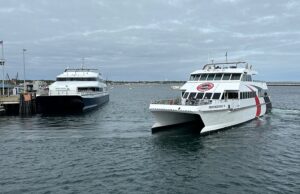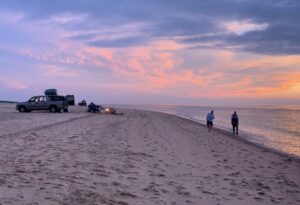PROVINCETOWN — The end of July marks the halfway point for Provincetown’s bustling tourist season — the May-through-October stretch when many households and businesses here earn 90 percent or more of their income.

Even halfway through the season, though, it’s been hard to tell whether this year is up or down — better or worse, in dollar terms, than last year.
People who watch the industry professionally, including the town’s Tourism Director Tony Fuccillo and chamber of commerce President Patrick Patrick, say they’re hearing a wider-than-usual range of experiences from business owners, with some having excellent years and others suffering double-digit downturns.
A range of data gathered by the Independent also point in different directions.
The number of people arriving by ferry between mid-May and the last Saturday in July — a 10-week stretch that includes Memorial Day, the Fourth of July, and Bear Week — is down 10 percent this year compared to the same period in 2024, according to passenger data on file at the pier manager’s office.
Passenger counts on the Dolphin Fleet of whale-watch boats are down about 11 percent — from 36,015 passengers between April 14 and July 29 last year to about 32,000 this year, according to pier data and Dolphin Fleet Vice President Paul Milliken.
At Art’s Dune Tours, an exceptional string of rainy weekends this spring helped drop revenue to date about 15 percent below last year’s number, according to company owner Rob Costa.
And the town’s data on short-term rental taxes — which are now reported separately from the tax on hotels, motels, and campgrounds — show that short-term rentals collectively earned about 12 percent less this January through June than they did in the same months in 2024.
Other data show an increase in sales, however. The town’s hotels, motels, and campgrounds enjoyed 9 percent higher sales this spring than last January through June, the town’s tax data show.
Receipts from the meals tax, which is paid on every transaction in the town’s restaurants, are up 10 percent this January through June compared to last spring’s figures.
The town’s parking lots are filling up earlier and staying full longer than they did last year, according to parking administrator David Anderson. Parking revenue townwide is up 48 percent from May 1 through July 27 — partly because of 113 new paid parking spaces along the east end of Commercial Street, Anderson said, but also because there are more drivers here staying for longer periods of time.
And many retailers have been having a good year, Patrick said. At his family’s costume and novelty store Marine Specialties, sales are up by 15 percent, not including a tariff surcharge that has recently been in place to cover the unstable price of imported wares, he said.

Patrick also has a new store called Tugboat at the former site of Cuffy’s that sells a lot of “Cape Cod”-branded clothing to day-trippers, Patrick said, as compared to Marine Specialties, which sells a lot of “P’town” and Pride-themed merchandise.
“The stores are only two blocks apart, and yet they have a very different clientele,” said Patrick. “At Tugboat, we see lots of families, groups of women of all ages, and a lot of straight couples, whereas at Marine Specialties the clientele is about half straight and half gay.” Business has been strong at both locations. “I’ve been surprised how well Tugboat is doing, and we’re breaking records at Marine Specialties,” Patrick said.
Fuccillo and Assistant Tourism Director Nina Cantor said there is an obvious absence of Canadian vacationers this year, largely as a result of President Trump’s rhetoric about annexing their country.
“We receive these very polite emails that say we love your town, we love Cape Cod, but we’re not coming this year because of the administration in the White House,” Fuccillo said.
The town doesn’t permit or count bus tours, Cantor said, but business owners in town have told her that about 30 Canadian tour buses have canceled their bookings this year.
“We do have European travelers this year, especially LGBTQ travelers,” Fuccillo said. The town advertises in Germany, Switzerland, Austria, and the United Kingdom, and that ad campaign is set to resume in January to encourage bookings for next summer, he said.
For most of the year, the town’s advertising dollars are focused on a “driving-distance market” that runs from Washington, D.C. to Pennsylvania, New York, and New England, Fuccillo said. That corridor of states accounts for roughly 85 percent of travelers in town, according to Cantor, although the town is seeking more precise figures.
“Some of those people are flying into Logan and taking the ferry,” Fuccillo said, “and we do advertise in Atlanta, Illinois, California, and in nationwide campaigns. But the majority of our tourists are in what we call the driving market, which is the mid-Atlantic states and the Northeast.”
Costa said that 10 tour buses that had booked their passengers on the Dune Tours have canceled this year, “and each of those buses has like 40 people on them.
“We try to adapt and add new things, but it’s a big hit,” Costa said. “Fortunately, July was pretty good.”
Patrick and Fuccillo both said they had expected this season to be worse.
“It surprised me at first, but I’m hearing people say business is good,” said Patrick. “There’s some softness in short-term rentals, but restaurants and retail are strong.”
“A business owner told me that ‘May was terrible, and if it continues this way it will close me down,’ ” Fuccillo said, “but I spoke to him recently and he said June had improved. He’s hopeful that July and August will make up for the slow start this year.”



